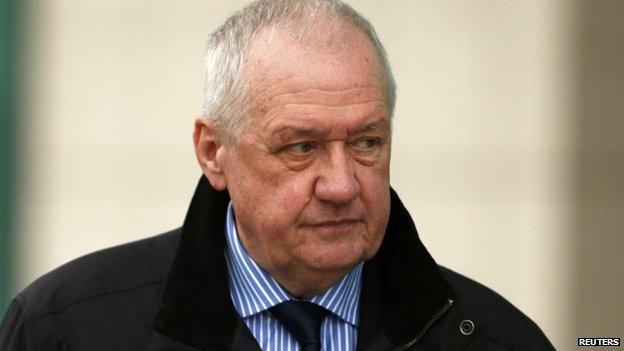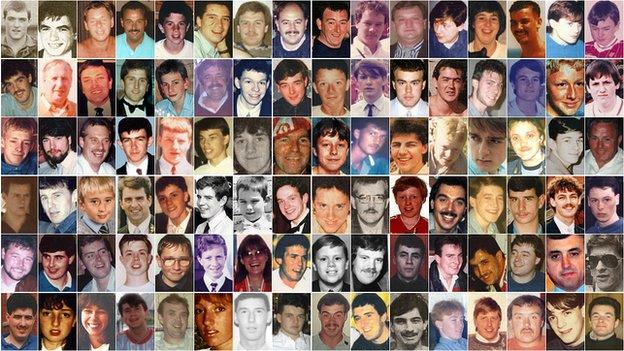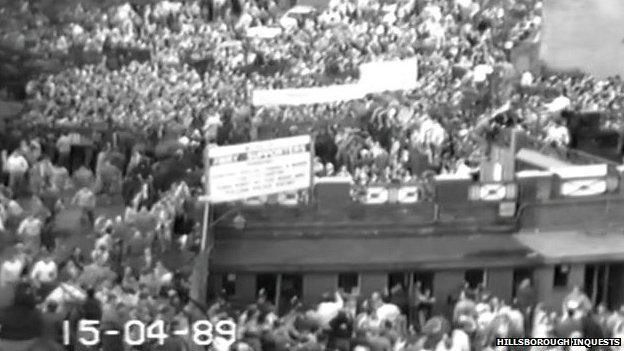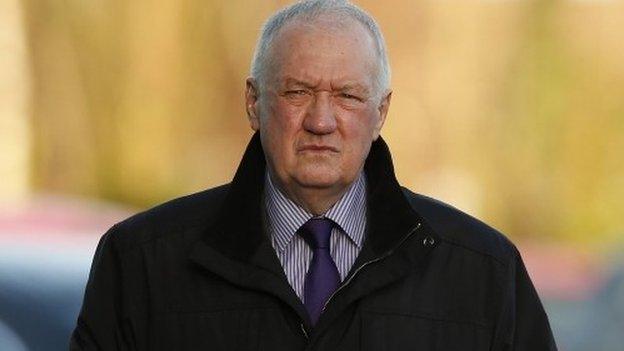David Duckenfield: Hillsborough buck stops with me
- Published

David Duckenfield was in charge when a crush developed in terraced pens on 15 April 1989
The police match commander on the day of the Hillsborough disaster has told a jury "ultimately, the buck stops with me".
David Duckenfield said he had taken advice from colleagues but had not done "the easiest thing" and blamed others for his mistakes.
The former chief superintendent was in charge when a crush developed during the 1989 FA Cup semi-final.
On Thursday, he denied his account of events was the beginning of a cover-up.
But Mr Duckenfield agreed he was incompetent and his "mistakes" and "oversight" had contributed to the deaths of 96 fans.
Giving evidence for a fourth day at the new inquests into the disaster, Mr Duckenfield was asked about Supt Bernard Murray, who worked with him in the police control box and was experienced in policing Hillsborough.
'Too late'
He said: "I'm the man in overall control. I seek guidance and assistance from others with greater experience.
"But, ultimately the buck stops with me."
Rajiv Menon QC, representing a group of victims' families, put it to Mr Duckenfield his leadership was "woefully inadequate from start to finish".
He said his actions were "too little, too late".
Mr Duckenfield said it was a "tragedy" but defended his leadership.
The court heard how dog handlers and extra manpower had been requested before a "fleet of ambulances" were called to the stadium.
The jury saw the log of radio communications between the police control box and force headquarters in Sheffield.
It showed PC Michael Ryan had called for dog handlers at 15:04 BST, and the call for ambulances was made two minutes and 40 seconds later.
The match was stopped by a senior police officer at 15:06 BST.
Mr Menon said: "At the time that you recognise this is a possible medical emergency, PC Ryan is requesting dogs. Can you please explain that?"
"I cannot sir," Mr Duckenfield said.

Who were the 96 victims?

BBC News: Profiles of all those who died

"I have no idea, other than possibly contingency to put a line of officers across the pitch for my secure area for rescue."
The barrister said fans in the central pens needed to be "freed from those dreadfully overcrowded pens as soon as possible" and required immediate urgent medical assistance.
"That's what they needed to save lives," Mr Menon said.
Mr Duckenfield agreed.
The jury heard the radio log did not record Mr Duckenfield declaring a major incident. He said declared it "simultaneously" with other activities and it may not have been recorded.
"I can't do everything at once. It's a crisis, I'm doing my best under very difficult circumstances. The atmosphere is electric, tense, manic," he said.
"Not like this courtroom today, sitting here, just examining one moment in time.
"If you read on and look at other evidence from the Racal [emergency radio transmissions] tapes from other organisations, it would appear that whilst I haven't got it recorded there, then others understood the situation."
'Every second counts'
Mr Menon continued: "It's just not good enough, is it Mr Duckenfield?
"It's too little, too late and lives were lost as a result.
"An emergency response, particularly following a crushing incident, needs to be as quick as possible, because every second counts, do you accept that?"
Mr Duckenfield said he did.
But he disagreed his leadership and co-ordination of the emergency response was "woefully inadequate".
Mr Duckenfield also told the inquests he did not hear a message calling for the closure of a tunnel leading to the central pens on the Leppings Lane terraces, where the crush occurred.
The inquests have previously heard how a note of this request "vanished from the record".
The note, logged at 14:55 GMT by the CCTV operator in the police control box, said: "From officers at rear of Leppings Lane terrace, shut the gates at the back of the tunnel."
But the court heard it did not appear in former PC Trevor Bichard's second version of his log, written sometime between 16 April and his statement on 2 May.
Mr Menon said it was either innocently left it out, or there was another reason for the omission.
He said: "What a remarkable coincidence, would you agree, that the one missing entry is the most important entry in the whole log. Can you explain that?"
Mr Duckenfield, who has repeatedly denied his actions were negligent, says he only became aware of this when Mr Bichard gave evidence.
Press conference
He says he did not hear the words when he was in the police control box.
Earlier this week, Mr Duckenfield admitted how he lied to former FA chief executive Graham Kelly about fans forcing an exit gate open to enter the ground in the disaster's aftermath when he had ordered it to be opened.
But the jury heard how Peter Wright, South Yorkshire's chief constable at the time, gave a press conference after the disaster, in which he told journalists: "I'm not saying that a gate was not opened.
'I'm saying that there was an incident at the entrance to Leppings Lane outside the ground.
"I'm not in a position to say whether there was any connection between that incident and the surge at the ground."
The conference was held at 18:45 BST on the evening of the disaster - he met with Mr Duckenfield about 18:00 BST.
The chief constable added: "The gate was opened at police direction, I am not aware of any connection between the opening of the gate and the surge on the terrace."

The jury has previously been shown CCTV of the scene outside the stadium shortly before kick-off
Mr Duckenfield said that did not come from him.
Michael Mansfield QC, representing Hillsborough families, asked if this was a "ploy" and a step to "sever the link between the opening of the gate and what happened on the terraces".
Mr Duckenfield said it was not something he discussed with Mr Wright.
But he agreed Mr Wright was giving a "false impression".
Mr Mansfield said: "The impression he is giving is that the opening of the gate and what happened on the terraces are not connected."
Mr Duckenfield agreed.
He also told the hearing he could not recall meeting or speaking to then Prime Minister Margaret Thatcher when she visited Hillsborough on the day after the disaster.
The inquests heard in a memo after the disaster, Mr Wright wrote: "We've got nothing to fear."
He added: "If it is that drunken, marauding fans contributed to this, let somebody else say it."
Mr Duckenfield said he was with the chief constable but was not party to policy decisions [on blaming the fans].
The inquests, sitting in Warrington, Cheshire continue.
- Published12 March 2015

- Published11 March 2015

- Published10 March 2015
